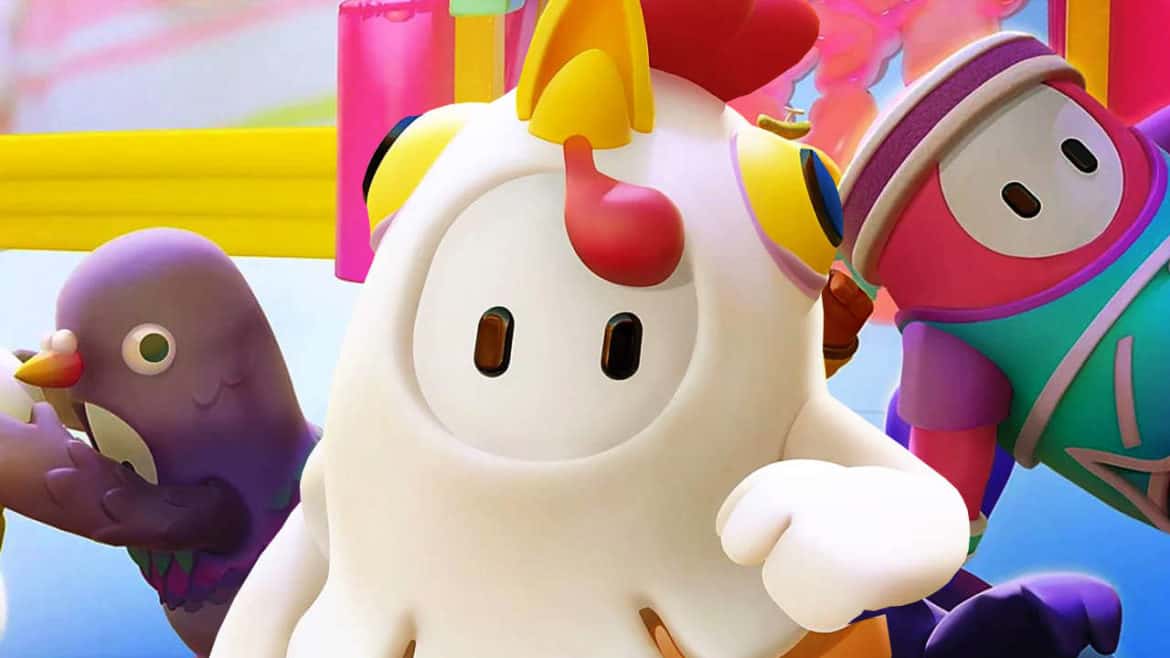
Fall Guys’ charming presentation and approachable mechanics make it the most welcoming battle royale yet, with just a few blemishes keeping it from greatness.
Battle royales have only been around for a handful of years, and for the most part they’ve strictly stuck within the same genre of games. Whether you’re playing Warzone, Fortnite, or Apex Legends, you’re always shooting a gun and running from an encroaching circle, with the differences kicking up in the small variations to their established formulas. Fall Guys: Ultimate Knockout, an extremely colorful and whimsical battle royale, is a great example of the genre growing outside of its roots. It’s a far more approachable take on the multiplayer format, with simple controls and a variety of mini-games giving this competitive game show as much charm as they do tension.
Playing as one of 60 multi-colored, jelly bean-shaped contestants, you compete in a joyous and comical race to be crowned the winner of Fall Guys’ 15-minute matches. Each one is broken up by various mini-games, with handfuls of players eliminated after each one. These games all take on a variety of themes, from straight-forward obstacle course races to frantic team games where you’re hoarding as many eggs as you can into a basket. The mini-games make good use of Fall Guys’ easy-to-understand control scheme, which lets you jump, dive, and grab with ease. Combined with the adorably clumsy movement animations, charming game show presentation, and suitably electric (and fantastic) soundtrack, Fall Guys will quickly catch your attention both visually and aurally.
The pickup and play nature of Fall Guys is one of its strongest aspects, along with its quick and entertaining games. It’s never unclear when you need to jump over a gap or navigate through the hordes of contestants trying to reach the finish line before you. It’s the type of game you can play in groups by passing the controller, with no need for a deep understanding of multiple mechanics to enjoy it. Its approachability lets anyone have fun with it, while its stages bring out glimmers of strategy for seasoned players to take advantage of.
With two dozen types of stages in rotation, Fall Guys features a lot of variety to its matches. Although every game kicks off with a race, each one is presented with different obstacles and elements that make them feel distinct from one another. The Whirlygig, for example, is one of the longest you’ll encounter, featuring spinning fans and numerous platforms with rotating hazards ready to knock you off course. By contrast, Door Dash is a much shorter race filled with rows of closed doors, with a random few opening once players have dived through them. The hunt for single routes through each stage of doors create hilarious bottlenecks through doorways not equipped for the stress, sending players tumbling to the floor as the group attempts to stampede to the end. It’s ridiculous, but equally hilarious every time.
If you’ve ever watched Wipeout or Takeshi’s Castle, you’ll recognize the slapstick nature to the stages and appreciate the care taken to balance elements of luck and skill, with only a handful missing this mark.
Other survival-based modes are equally frantic and stressful. Roll Out puts all players on a string of rotating platforms, with random walls, obstacles, and gaps thrown in as they spin around. Moving between platforms while avoiding the hordes of other players trying to do the same is as comical as it is strategic. Block Party captures this feeling too, challenging you to fit into increasingly shrinking gaps in incoming walls. These survival modes don’t require the most dexterous platforming, generally ending well before things speed up to an uncomfortable pace. But the way they force all players to get uncomfortably close to one another and sow random chaos is extremely effective.
If you’ve ever watched Wipeout or Takeshi’s Castle, you’ll recognize the slapstick nature to the stages and appreciate the care taken to balance elements of luck and skill, with only a handful missing this mark. Tail Tag gives some players tails and tasks everyone else with hunting them down and yanking it off for themselves. It should be a fun game of tag, but with players moving the same speed and the distance required to latch on and steal a tail being so small, it quickly becomes a frustrating run-around. It’s even worse when used as the match type for the final stage, where the only player at the end with a tail wins the whole thing. This stage is too large for the handful of players left in the game, giving an unfair advantage to the one that happens to start with the tail. Fall Mountain, a finale race mode, is equally deflating to play after the effort required to get there. It’s an extremely brief course that can be derailed entirely by unsighted hits from comically large cannon-launched balls or poor starting position.
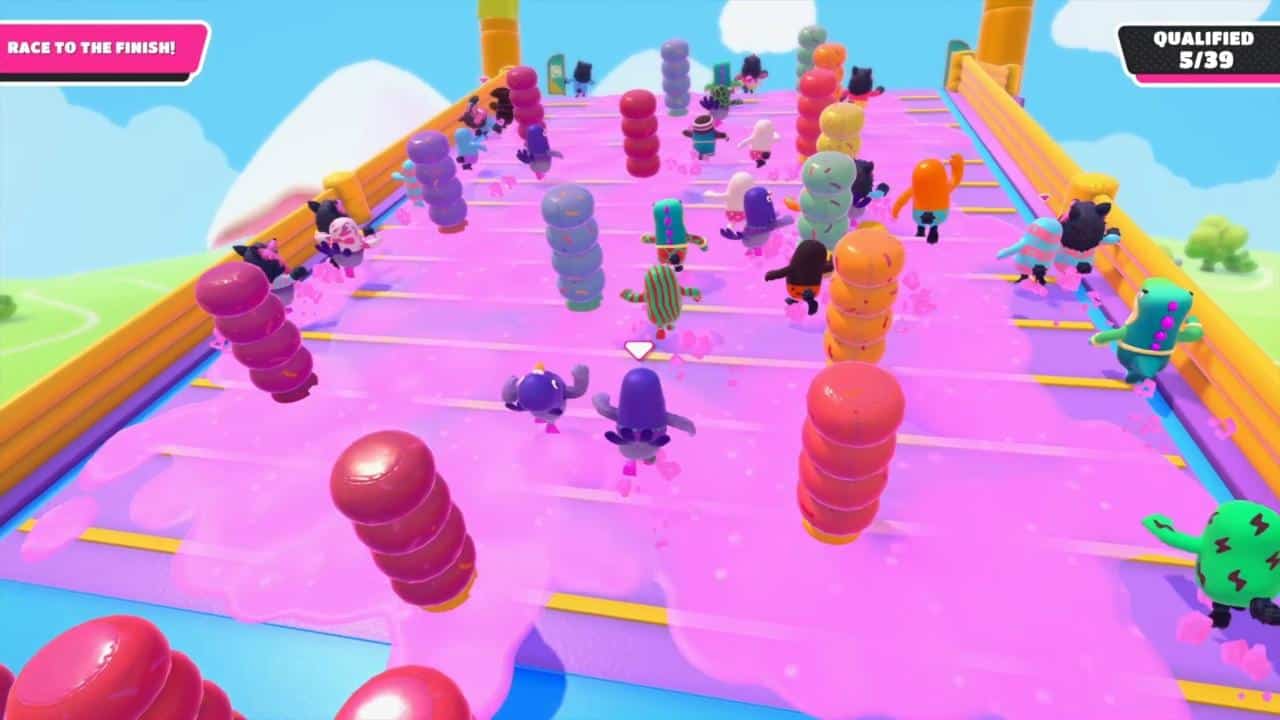
Not all of the finales in Fall Guys face these issues, however, with the remaining two serving as standouts. Hex-A-Gone is a nerve-wracking platforming test where the ground disappears beneath you as you run over it. It’s a game where you’re rewarded for staying on a level of platforms for as long as possible, either by making smart jumps across gaps made by other players or navigating intelligently around each level to stay above the pit of slime below. Similarly, Jump Showdown puts all players on a single platform with two spinning beams. They move at different speeds, forcing you to continue moving and time your jumps so that you aren’t caught out when both beams line up. These two modes involve a level of skill that make them more suitable for determining the overall winner of the game.
You’ll frequently be thrown into team-based modes too, which can either delight or dishearten based on who you’re paired up with. A race to get a giant ball through an obstacle course can become a test of patience when just one or two teammates aren’t pulling their weight, while games of oversized soccer can feel extremely one-sided for the same reasons. These aren’t faults of the game modes themselves–most capture the same goofy fun of the solo ones, with Egg Scramble and Hoarders presenting stressful but satisfying spins of egg collection and football juggling respectively. But when your entire team is eliminated thanks to just one or two players, it does take some of the excitement out of immediately jumping into another game.
Sticking with battle royale tropes, Fall Guys also features its own battle pass. It isn’t, however, one you’ll need to purchase to reap the best rewards. Instead it’s the game’s main source of progression, with points from each match going towards unlocking new skin patterns, color schemes, costumes, and more. Each match will also reward you with varying amounts of in-game currency based on your performance, which you can use in the store to purchase the same types of cosmetics. Crowns, awarded to you for wins, can be used to purchase rarer and more complex cosmetic items, giving you incentive to keep playing for those victories. You can spend real money to purchase more of the regular in-game currency, but it’s doled out in enough quantities that this only feels necessary if you feel you absolutely must have an item immediately.
With its short games and easy-to-grasp mechanics, Fall Guys is easily the most approachable and welcoming battle royale yet. Its bursting color and varied game modes do a good job of reeling you in and keeping you hooked, even if a handful feel at odds with the easygoing nature of its premise. It can be disheartening to have a game end prematurely due to uneven team matches and, worse still, when you’re forced into one of Fall Guys’ unsatisfying finale modes. But neither are enough to derail the fun Fall Guys consistently generates, with its chaotic obstacle courses and earworm soundtrack ensuring you’ll be coming back for more.

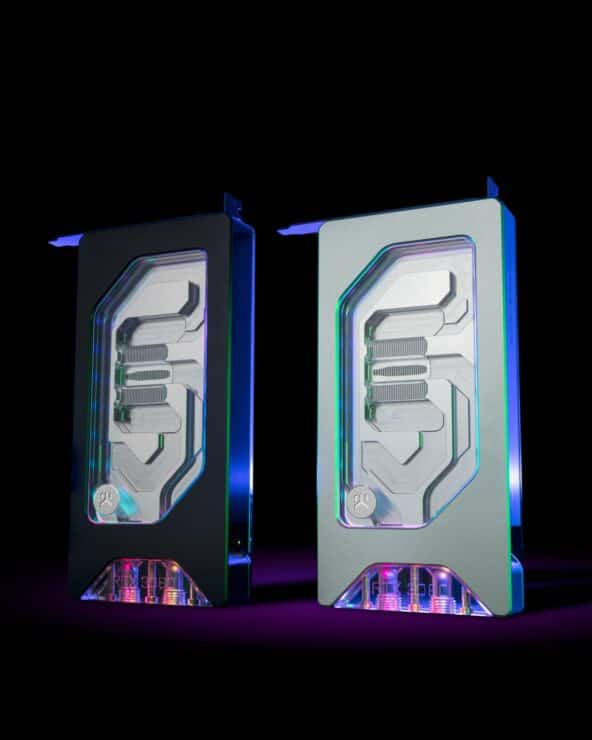
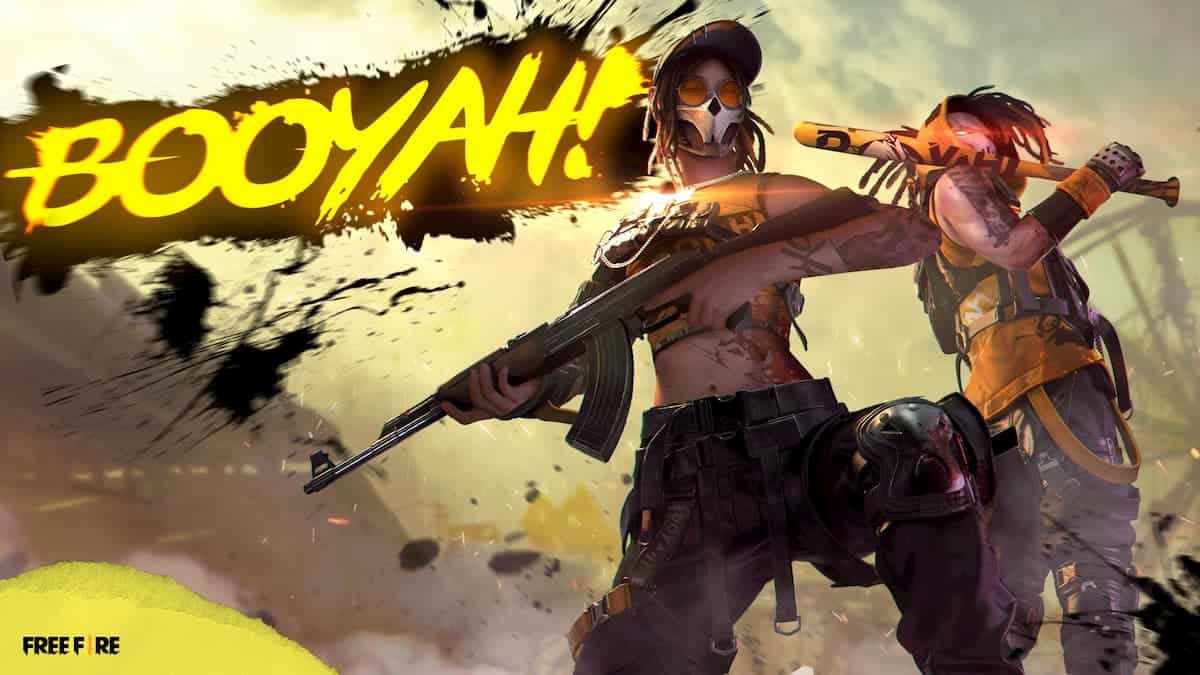
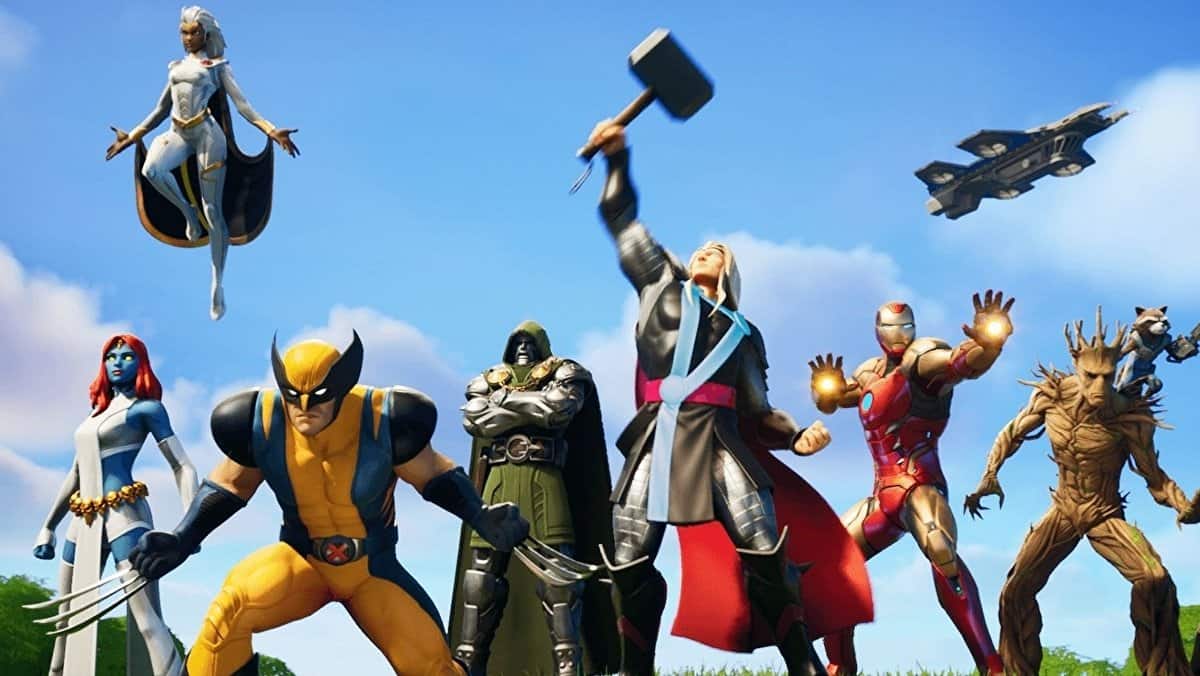

More Stories
Firefighting Simulator – The Squad review — Through the fire and the shame
Maid of Sker review — Death in the slow lane
PHOGS! review – It’s a dog-help-dog world out there